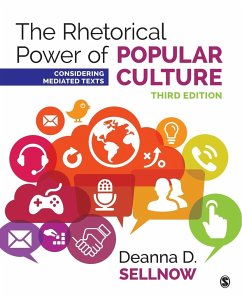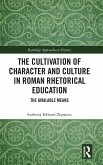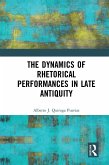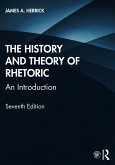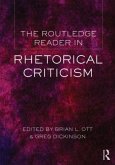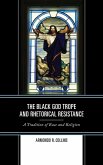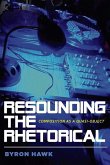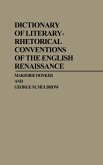- Broschiertes Buch
- Merkliste
- Auf die Merkliste
- Bewerten Bewerten
- Teilen
- Produkt teilen
- Produkterinnerung
- Produkterinnerung
This book is a step-by-step introduction to rhetorical theory and criticism by focusing on the powerful roles TV programs, advertisements, music, comics, and movies play in persuading us on what to believe and how to behave.
Andere Kunden interessierten sich auch für
![The Cultivation of Character and Culture in Roman Rhetorical Education The Cultivation of Character and Culture in Roman Rhetorical Education]() Anthony Edward ZupancicThe Cultivation of Character and Culture in Roman Rhetorical Education152,99 €
Anthony Edward ZupancicThe Cultivation of Character and Culture in Roman Rhetorical Education152,99 €![The Dynamics of Rhetorical Performances in Late Antiquity The Dynamics of Rhetorical Performances in Late Antiquity]() Alberto J. Quiroga PuertasThe Dynamics of Rhetorical Performances in Late Antiquity64,99 €
Alberto J. Quiroga PuertasThe Dynamics of Rhetorical Performances in Late Antiquity64,99 €![The History and Theory of Rhetoric The History and Theory of Rhetoric]() James A. HerrickThe History and Theory of Rhetoric86,99 €
James A. HerrickThe History and Theory of Rhetoric86,99 €![The Routledge Reader in Rhetorical Criticism The Routledge Reader in Rhetorical Criticism]() The Routledge Reader in Rhetorical Criticism86,99 €
The Routledge Reader in Rhetorical Criticism86,99 €![The Black God Trope and Rhetorical Resistance The Black God Trope and Rhetorical Resistance]() Armondo R. CollinsThe Black God Trope and Rhetorical Resistance101,99 €
Armondo R. CollinsThe Black God Trope and Rhetorical Resistance101,99 €![Resounding the Rhetorical Resounding the Rhetorical]() Byron HawkResounding the Rhetorical61,99 €
Byron HawkResounding the Rhetorical61,99 €![Dictionary of Literary-Rhetorical Conventions of the English Renaissance Dictionary of Literary-Rhetorical Conventions of the English Renaissance]() Marjorie P. DonkerDictionary of Literary-Rhetorical Conventions of the English Renaissance76,99 €
Marjorie P. DonkerDictionary of Literary-Rhetorical Conventions of the English Renaissance76,99 €-
-
-
This book is a step-by-step introduction to rhetorical theory and criticism by focusing on the powerful roles TV programs, advertisements, music, comics, and movies play in persuading us on what to believe and how to behave.
Hinweis: Dieser Artikel kann nur an eine deutsche Lieferadresse ausgeliefert werden.
Hinweis: Dieser Artikel kann nur an eine deutsche Lieferadresse ausgeliefert werden.
Produktdetails
- Produktdetails
- Verlag: SAGE Publications Inc
- 3 Revised edition
- Seitenzahl: 344
- Erscheinungstermin: 7. März 2017
- Englisch
- Abmessung: 235mm x 191mm x 19mm
- Gewicht: 516g
- ISBN-13: 9781506315218
- ISBN-10: 1506315216
- Artikelnr.: 45189158
- Herstellerkennzeichnung
- Libri GmbH
- Europaallee 1
- 36244 Bad Hersfeld
- gpsr@libri.de
- Verlag: SAGE Publications Inc
- 3 Revised edition
- Seitenzahl: 344
- Erscheinungstermin: 7. März 2017
- Englisch
- Abmessung: 235mm x 191mm x 19mm
- Gewicht: 516g
- ISBN-13: 9781506315218
- ISBN-10: 1506315216
- Artikelnr.: 45189158
- Herstellerkennzeichnung
- Libri GmbH
- Europaallee 1
- 36244 Bad Hersfeld
- gpsr@libri.de
Deanna D. Sellnow is a professor of strategic communication in the Nicholson School of Communication and Media at the University of Central Florida. She conducts research in two major areas. The first focuses on strategic instructional communication in a variety of contexts including both in-person and online classrooms, as well as risk, crisis, and health communication contexts. The second focuses on rhetorical studies of popular culture (ranging from music to advertisements to television programs and feature films). She has conducted funded research for the World Health Organization (WHO), the U.S. Geological Survey (USGS), the U.S. Department of Agriculture (USDA), the U.S. Department of Homeland Security (DHS), the National Oceanic and Atmospheric Administration (NOAA), and the U.S. Centers for Disease Control and Prevention (CDC). Her work is published in refereed national and international journals, as well as several books. She has presented her work across the United States and in many countries around the world, including Canada, China, Denmark, Egypt, England, Germany, Hong Kong, India, Indonesia, Ireland, Italy, Japan, Senegal, Singapore, Spain, Sweden, Türkiye, and Vietnam. She and her husband, Tim, have a daughter (Debbie) and son-in-law (Scott), son (Rick) and daughter-in-law (Sarah), and three grandchildren (Lincoln, Emmett, and Rosemary).
Preface
Acknowledgments
CHAPTER 1. WHAT IS POPULAR CULTURE AND WHY STUDY IT?
What Is Popular Culture?
What Are Popular Culture Texts?
Why Study Popular Culture?
Conducting Rhetorical Analyses of Popular Culture Texts
Sample Student Essay
Summary
Challenge
Suggested Readings
References
CHAPTER 2. EXPANDING THE RHETORICAL TRADITION
The Nature of Rhetoric and Rhetorical Criticism
Evolution of the Rhetorical Tradition
The Neo-Aristotelian Approach to Rhetorical Criticism
New (Contemporary and Postmodern) Rhetorical Approaches
Sample Student Essay
Summary
Challenge
Suggested Readings
References
CHAPTER 3. A NARRATIVE PERSPECTIVE
Narration
Narrative Rationality
Conducting a Narrative Analysis
Sample Student Essay
Summary
Challenge
Suggested Readings
References
CHAPTER 4. A DRAMATISTIC PERSPECTIVE
The Dramatistic Life Cycle
Cluster Analysis
The Pentad
Conducting a Dramatistic Analysis
Sample Student Essays
Summary
Challenge
Suggested Readings
References
CHAPTER 5. A SYMBOLIC CONVERGENCE PERSPECTIVE
Fantasy Theme Analysis
Rhetorical Visions, Master Analogues, and Life Cycles
Conducting a Symbolic Convergence Analysis
Sample Analysis
Sample Student Essays
Summary
Challenge
Suggested Readings
References
CHAPTER 6. A NEO-MARXIST PERSPECTIVE
Ideology and Hegemony
Materialism and Economic Metaphors
Sites of Struggle
Conducting a Neo-Marxist Analysis
Sample Student Essays
Summary
Challenge
Suggested Readings
References
CHAPTER 7. FEMINIST PERSPECTIVES
Hegemony
Sites of Struggle
Waves of Feminism
Feminist Perspectives
Conducting a Feminist Analysis
Sample Student Essays
Summary
Challenge
Suggested Readings
References
CHAPTER 8. A MUSIC PERSPECTIVE: THE ILLUSION OF LIFE
Music as Rhetoric
The Illusion of Life
Conducting an Illusion of Life Analysis
Sample Student Essays
Summary
Challenge
Suggested Readings
References
CHAPTER 9. VISUAL PERSPECTIVES
History and Nature of Visual Communication
Visual Theory Perspectives
Visual Pleasure Theory
Conducting a Visual Pleasure Analysis
Sample Student Essay
Summary
Challenge
Suggested Readings
References
CHAPTER 10. MEDIA-CENTERED PERSPECTIVES
Media Ecology Theory
Media Logic
Social Learning Theory
Parasocial Relationship Theory
Cultivation Theory
Conducting an Analysis Using a Media-Centered Perspective
Sample Student Essay
Summary
Challenge
Suggested Readings
References
Appendix. Writing a Popular Culture Rhetorical Essay
Glossary
Index
About the Author
Acknowledgments
CHAPTER 1. WHAT IS POPULAR CULTURE AND WHY STUDY IT?
What Is Popular Culture?
What Are Popular Culture Texts?
Why Study Popular Culture?
Conducting Rhetorical Analyses of Popular Culture Texts
Sample Student Essay
Summary
Challenge
Suggested Readings
References
CHAPTER 2. EXPANDING THE RHETORICAL TRADITION
The Nature of Rhetoric and Rhetorical Criticism
Evolution of the Rhetorical Tradition
The Neo-Aristotelian Approach to Rhetorical Criticism
New (Contemporary and Postmodern) Rhetorical Approaches
Sample Student Essay
Summary
Challenge
Suggested Readings
References
CHAPTER 3. A NARRATIVE PERSPECTIVE
Narration
Narrative Rationality
Conducting a Narrative Analysis
Sample Student Essay
Summary
Challenge
Suggested Readings
References
CHAPTER 4. A DRAMATISTIC PERSPECTIVE
The Dramatistic Life Cycle
Cluster Analysis
The Pentad
Conducting a Dramatistic Analysis
Sample Student Essays
Summary
Challenge
Suggested Readings
References
CHAPTER 5. A SYMBOLIC CONVERGENCE PERSPECTIVE
Fantasy Theme Analysis
Rhetorical Visions, Master Analogues, and Life Cycles
Conducting a Symbolic Convergence Analysis
Sample Analysis
Sample Student Essays
Summary
Challenge
Suggested Readings
References
CHAPTER 6. A NEO-MARXIST PERSPECTIVE
Ideology and Hegemony
Materialism and Economic Metaphors
Sites of Struggle
Conducting a Neo-Marxist Analysis
Sample Student Essays
Summary
Challenge
Suggested Readings
References
CHAPTER 7. FEMINIST PERSPECTIVES
Hegemony
Sites of Struggle
Waves of Feminism
Feminist Perspectives
Conducting a Feminist Analysis
Sample Student Essays
Summary
Challenge
Suggested Readings
References
CHAPTER 8. A MUSIC PERSPECTIVE: THE ILLUSION OF LIFE
Music as Rhetoric
The Illusion of Life
Conducting an Illusion of Life Analysis
Sample Student Essays
Summary
Challenge
Suggested Readings
References
CHAPTER 9. VISUAL PERSPECTIVES
History and Nature of Visual Communication
Visual Theory Perspectives
Visual Pleasure Theory
Conducting a Visual Pleasure Analysis
Sample Student Essay
Summary
Challenge
Suggested Readings
References
CHAPTER 10. MEDIA-CENTERED PERSPECTIVES
Media Ecology Theory
Media Logic
Social Learning Theory
Parasocial Relationship Theory
Cultivation Theory
Conducting an Analysis Using a Media-Centered Perspective
Sample Student Essay
Summary
Challenge
Suggested Readings
References
Appendix. Writing a Popular Culture Rhetorical Essay
Glossary
Index
About the Author
Preface
Acknowledgments
CHAPTER 1. WHAT IS POPULAR CULTURE AND WHY STUDY IT?
What Is Popular Culture?
What Are Popular Culture Texts?
Why Study Popular Culture?
Conducting Rhetorical Analyses of Popular Culture Texts
Sample Student Essay
Summary
Challenge
Suggested Readings
References
CHAPTER 2. EXPANDING THE RHETORICAL TRADITION
The Nature of Rhetoric and Rhetorical Criticism
Evolution of the Rhetorical Tradition
The Neo-Aristotelian Approach to Rhetorical Criticism
New (Contemporary and Postmodern) Rhetorical Approaches
Sample Student Essay
Summary
Challenge
Suggested Readings
References
CHAPTER 3. A NARRATIVE PERSPECTIVE
Narration
Narrative Rationality
Conducting a Narrative Analysis
Sample Student Essay
Summary
Challenge
Suggested Readings
References
CHAPTER 4. A DRAMATISTIC PERSPECTIVE
The Dramatistic Life Cycle
Cluster Analysis
The Pentad
Conducting a Dramatistic Analysis
Sample Student Essays
Summary
Challenge
Suggested Readings
References
CHAPTER 5. A SYMBOLIC CONVERGENCE PERSPECTIVE
Fantasy Theme Analysis
Rhetorical Visions, Master Analogues, and Life Cycles
Conducting a Symbolic Convergence Analysis
Sample Analysis
Sample Student Essays
Summary
Challenge
Suggested Readings
References
CHAPTER 6. A NEO-MARXIST PERSPECTIVE
Ideology and Hegemony
Materialism and Economic Metaphors
Sites of Struggle
Conducting a Neo-Marxist Analysis
Sample Student Essays
Summary
Challenge
Suggested Readings
References
CHAPTER 7. FEMINIST PERSPECTIVES
Hegemony
Sites of Struggle
Waves of Feminism
Feminist Perspectives
Conducting a Feminist Analysis
Sample Student Essays
Summary
Challenge
Suggested Readings
References
CHAPTER 8. A MUSIC PERSPECTIVE: THE ILLUSION OF LIFE
Music as Rhetoric
The Illusion of Life
Conducting an Illusion of Life Analysis
Sample Student Essays
Summary
Challenge
Suggested Readings
References
CHAPTER 9. VISUAL PERSPECTIVES
History and Nature of Visual Communication
Visual Theory Perspectives
Visual Pleasure Theory
Conducting a Visual Pleasure Analysis
Sample Student Essay
Summary
Challenge
Suggested Readings
References
CHAPTER 10. MEDIA-CENTERED PERSPECTIVES
Media Ecology Theory
Media Logic
Social Learning Theory
Parasocial Relationship Theory
Cultivation Theory
Conducting an Analysis Using a Media-Centered Perspective
Sample Student Essay
Summary
Challenge
Suggested Readings
References
Appendix. Writing a Popular Culture Rhetorical Essay
Glossary
Index
About the Author
Acknowledgments
CHAPTER 1. WHAT IS POPULAR CULTURE AND WHY STUDY IT?
What Is Popular Culture?
What Are Popular Culture Texts?
Why Study Popular Culture?
Conducting Rhetorical Analyses of Popular Culture Texts
Sample Student Essay
Summary
Challenge
Suggested Readings
References
CHAPTER 2. EXPANDING THE RHETORICAL TRADITION
The Nature of Rhetoric and Rhetorical Criticism
Evolution of the Rhetorical Tradition
The Neo-Aristotelian Approach to Rhetorical Criticism
New (Contemporary and Postmodern) Rhetorical Approaches
Sample Student Essay
Summary
Challenge
Suggested Readings
References
CHAPTER 3. A NARRATIVE PERSPECTIVE
Narration
Narrative Rationality
Conducting a Narrative Analysis
Sample Student Essay
Summary
Challenge
Suggested Readings
References
CHAPTER 4. A DRAMATISTIC PERSPECTIVE
The Dramatistic Life Cycle
Cluster Analysis
The Pentad
Conducting a Dramatistic Analysis
Sample Student Essays
Summary
Challenge
Suggested Readings
References
CHAPTER 5. A SYMBOLIC CONVERGENCE PERSPECTIVE
Fantasy Theme Analysis
Rhetorical Visions, Master Analogues, and Life Cycles
Conducting a Symbolic Convergence Analysis
Sample Analysis
Sample Student Essays
Summary
Challenge
Suggested Readings
References
CHAPTER 6. A NEO-MARXIST PERSPECTIVE
Ideology and Hegemony
Materialism and Economic Metaphors
Sites of Struggle
Conducting a Neo-Marxist Analysis
Sample Student Essays
Summary
Challenge
Suggested Readings
References
CHAPTER 7. FEMINIST PERSPECTIVES
Hegemony
Sites of Struggle
Waves of Feminism
Feminist Perspectives
Conducting a Feminist Analysis
Sample Student Essays
Summary
Challenge
Suggested Readings
References
CHAPTER 8. A MUSIC PERSPECTIVE: THE ILLUSION OF LIFE
Music as Rhetoric
The Illusion of Life
Conducting an Illusion of Life Analysis
Sample Student Essays
Summary
Challenge
Suggested Readings
References
CHAPTER 9. VISUAL PERSPECTIVES
History and Nature of Visual Communication
Visual Theory Perspectives
Visual Pleasure Theory
Conducting a Visual Pleasure Analysis
Sample Student Essay
Summary
Challenge
Suggested Readings
References
CHAPTER 10. MEDIA-CENTERED PERSPECTIVES
Media Ecology Theory
Media Logic
Social Learning Theory
Parasocial Relationship Theory
Cultivation Theory
Conducting an Analysis Using a Media-Centered Perspective
Sample Student Essay
Summary
Challenge
Suggested Readings
References
Appendix. Writing a Popular Culture Rhetorical Essay
Glossary
Index
About the Author

